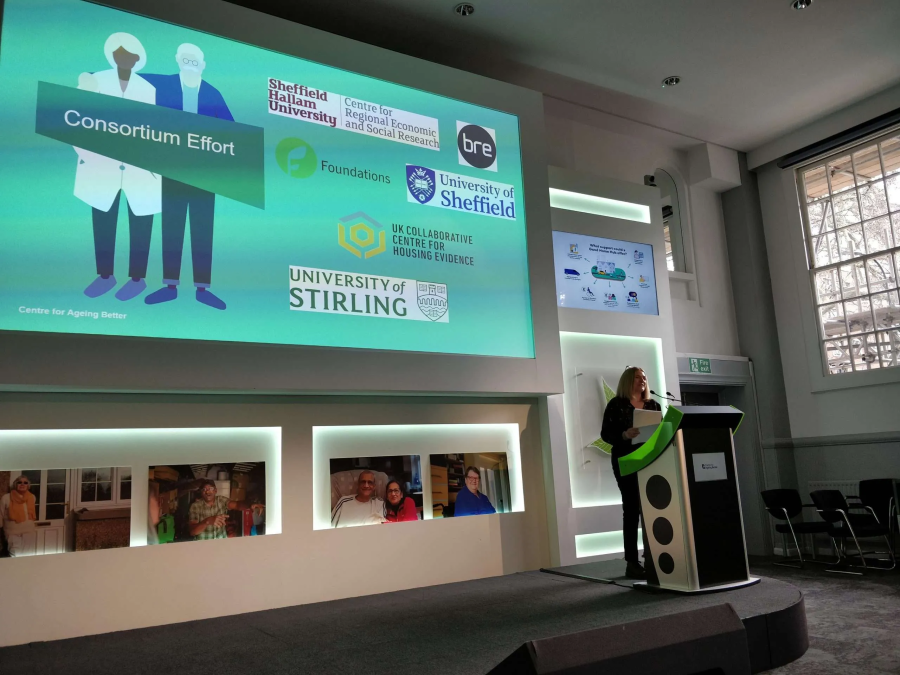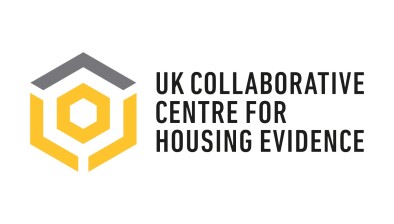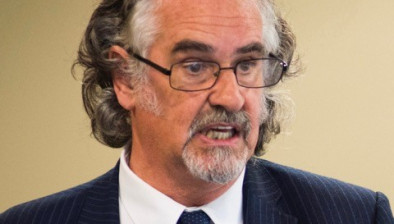Dr Jenny Preece: Improving our homes - from evidence to action

Dr Jenny Preece
Dr Jenny Preece, from the UK Collaborative Centre for Housing Evidence (CaCHE), reflects on a recent event hosted by the Centre for Ageing Better, where researchers unveiled a national evaluation of home improvement services, highlighting their impact on dignity, independence, and housing conditions.
Last month we were involved in a one-day event hosted by the Centre for Ageing Better, to launch our national evaluation of home improvement services.
The research – carried out over 18 months by a consortium comprising Sheffield Hallam University, the University of Stirling, the University of Sheffield, the Building Research Establishment, and Foundations – demonstrated the scale and scope of home improvement services, identified good practice, and presented an economic evaluation of the contribution these services make. On the day we presented headline findings from the evaluation and ran a workshop with attendees on good practice and the lived experience of home improvement.
One of the real highlights of the day was how the evaluation was connected to the wider challenge of housing conditions through keynote speakers and a panel discussion involving experts from across the spectrum of housing. Carole Easton OBE opened the day reflecting on the housing crisis that we don’t hear enough about – the challenge of poor conditions. This is an issue that has galvanised activists such as Kwajo Tweneboa who shared a number of case studies from his work highlighting the impacts of living in poor condition homes.
A number of points raised here became themes running throughout the day – the importance of people having dignity at home, and the way in which dignity can be restored through adaptations to the home but also lost when people’s homes do not allow them to fulfil basic needs such as toileting and showering. Cases also highlighted the importance of communication and control, again features of good practice in the evaluated services but notable by their absence in some of the vignettes presented throughout the day.
Our research shows the difference that a comprehensive home improvement service can have on people’s lives and in tackling local challenges at the intersection of housing and health. Services give people valuable information about how to tackle disrepair and homes that no longer support independence and dignity for their occupants. The evaluated home improvement services also see the person, which is not always the case, as Kwajo highlighted in describing cases in which people were treated as almost less than human.
Following workshops on good practice and lived experiences of home improvement, policy prioritisation, service mapping, and demonstrating the cost-benefit of services, a panel discussion looked to the future, asking: what’s next? David Orr CBE argued that the policy discourse on housing is almost exclusively focused on new homes, meaning we are not spending nearly enough time thinking about how we live well in the homes we already have.
What discussion there is remains heavily skewed towards conditions in the private rented sector, which ignores the fact that most people living in poor-condition homes own their homes. Staking a claim for the importance of homes in their own right, Jabeer Butt OBE defended a focus on the role of the home in everyday life, rather than housing condition debates being dominated by the cost savings which may be achieved for the NHS. As he put it, the NHS might save your life, but a good home helps you live it.
Holly Holder from the Centre for Ageing Better explained that the cost of funding better-condition homes does not have to fall exclusively on the Government, but they have a crucial role in creating an enabling environment and leveraging other sources of funding. Ensuring access to information and comprehensive home improvement services across the country is crucial, with journalist and author Vicky Spratt agreeing that home improvement services were a common sense solution to reducing the barriers to tackling poor conditions. However, as Vicky argued, it is important that interventions and support last beyond the electoral cycle to achieve the major transformations that are needed in this area.
The day was full of insights and reflections from attendees, with a clear interest in how we ensure that everyone can live in safe, comfortable, warm homes that provide dignity, independence and control. Learning exchanges were already being planned by attending organisations to share expertise, and others were making plans to implement good home hubs in their local areas to connect people to services.
This article was originally published on the CaCHE website.








